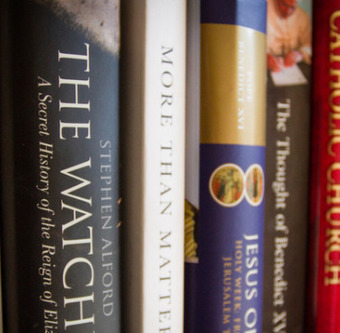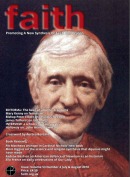
Book Review: The synthesis St. Thomas might have made?
Article:
01.07.18
Aquinas and Modern Science - A New Synthesis of Faith and Reason
by Gerard M. Verschuuren, Angelico Press, 233pp, £14.50
reviewed by Mark Higgins
For those acquainted with the ideas of the Faith Movement, the words ‘New Synthesis’ undoubtedly evoke a whole stream of thoughts, but when those words are tagged with ‘of Faith and Reason’, the reader is most definitely caused to sit up and pay attention. How will this work compare or contrast with Fr Holloway’s classic, Catholicism- a New Synthesis? - a book which endeavoured to draw together a harmonisation of the full Catholic Faith with modern science, underpinned by a new realist, existentialist, and only partly Thomistic, ontology? How will Verschuuren, himself a Geneticist with a further PhD in Philosophy of Science, bring about a synthesis of Faith and Reason? Will his project, like Fr Holloway’s, be a revision of St Thomas, discussing the areas in which the Angelic Doctor’s philosophical lens for viewing and explaining reality is no longer helpful, or will it be more along the lines of an accommodation or re-vindication of St. Thomas against the backdrop of modern science?
Connecting the dots
Fairly quickly into the work it is clear that the author is taking the latter option, and whilst at the very end of the book there is an almost reluctant admission that St. Thomas’ philosophy is indeed imperfect (p.233), the greater part of the work is a re-presentation of the metaphysics of St. Thomas alongside modern science, and, in a number of occasions a re-claiming of credit for the great Dominican as the originator, or at least a valuable contributor, towards a number of important theories/discoveries in modern science and the social sciences. Certainly, there is clearly a need to dispel the great myth of scientific darkness prior to Isaac Newton or perhaps René Descartes, and this book is very successful towards that end. It is also highly interesting to connect some of the dots from Aquinas’ writings to say, the scientific method (p.84), modern cosmological theories (p.115), Heisenberg’s indeterminacy principle (p.122), Neuroscience (p.191) and even modern economics (p.212), even if perhaps in some cases there are more dots to be passed over than others.
A crash course in Thomistics
Going through the book, the first three chapters offer a clear and concise demonstration of the metaphysical categories of Thomism, why metaphysics is unavoidable, and an explanation of the Four Causes. The author states towards the beginning of the book that one of his purposes is to offer scientists, and indeed anyone not particularly acquainted with the ‘Aristotelian-Thomistic’ metaphysical synthesis, as it were, a crash course in the subject, and he certainly achieves this. Towards the very end of the work there is a further ‘crash course’, this time in St. Thomas’ contribution in the diverse fields of sociology, ethics, politics and economics.
Unfortunately, I felt this presentation was in fact too brief and lacked the depth of the earlier treatment of St Thomas’ ontology, and, to a lesser extent epistemology, which was much more satisfying. Perhaps the author should have left the social sciences, and indeed, moral philosophy, for another book, I think most readers would have preferred the final few chapters to continue with the natural sciences rather than moving into the human field almost as an after-thought to the main subject matter of the work.
Intricate explanation
The most innovative feature of Verschuuren’s philosophical offering, and that which constitutes the central chapters of this publication, is his application of the Thomistic ‘Four Causes’ (or five, if we include ‘the exemplary cause’) towards a number of facets of modern science, particularly genetics, evolution, and neurology. In the chapter devoted to genetics, the author is clearly in his home territory and not only offers a thoughtful consideration of how the Aristotelian causes might apply within genetics, but also a fairly intricate explanation of the biochemistry underpinning genetic inheritance. The exploration of evolution and neurology is clearly not as scientifically rigorous as the aforementioned section, but the same attempt to suggest how St. Thomas would engage in a dialogue with these arenas of modern science is made more or less as successfully.
Rediscovering prime matter
Verschuuren is absolutely confident that St. Thomas would have accepted the science of evolution, that he would have incorporated it into his thinking (p.148), and most definitely would have rejected Intelligent Design as contrary to Almighty God’s general utilisation of secondary causes in the function and development of the universe which demonstrates his supreme intelligence and providence. Perhaps the most unfortunate feature of this book is that we don’t find any hints at the creative adaptation St. Thomas would have taken to ensure that his metaphysical understanding of reality would more adequately reflect the more connected and dynamic reality that modern science has brought to light. Instead the author follows two approaches, held in what seems to me a fair degree of tension. On the one hand he assures the reader that the metaphysics of St. Thomas are above and beyond science, untouchable by their new discoveries (p.87), but on the other, he occasionally lifts the shield and, as it were, concretely relates points of physical contact between the metaphysics of St. Thomas and the methods or even findings of scientists. One example of this in a chapter of the book on cosmology was the suggestion that physicists could be discovering, mirabile dictu, prime matter, as a way of explaining how gravitational waves operate under the constraints of the Thomistic denial of actio in distans (p.115).
Evocative of a directing mind
In spite of limitations there is still a lot to commend this title to a reader of Faith. The book is well researched, and the writing style is accessible yet academically rigorous, it also contributes to the field of apologetics, dispelling myths from within Church history and passionately defending the intellectual contribution of St. Thomas towards advances in Western Civilisation. Finally, whilst we don’t find a reconsideration or critique of Aquinas (even ensoulment is not touched upon), there are a lot of important connections made more generally between faith and modern science, demonstrated by the copious quotations taken from important contributors within science: evolutionary biologists, physicists, and geneticists, who have come to appreciate through their fields that the universe is outstandingly ordered, regular and even evocative of a directing mind.
Notes:
Fr Mark Higgins is a priest of the Archdiocese of Southwark.

